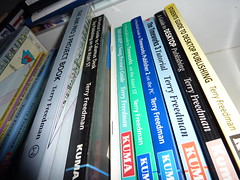Bad headlines
If there’s one thing that really annoys me it’s chapter headings and article headlines where you can’t tell what the subject matter is until you read it. Who needs a situation in which you don’t know if you want to read something until you have read it? The way I look at it is that if the author can’t even be bothered being clear when he’s trying to entice you to read his stuff, why should you be bothered to oblige him by reading it?
4 Reasons to get published
 It's important to be published by a traditional publisher
It's important to be published by a traditional publisher
Image by Terry Freedman via Flickr
In this day and age, in which anyone can publish and distribute their books electronically, or self-publish them by going down several routes (none of which need include the traditional vanity publisher), why should anyone bother approaching a traditional publisher? After all, very few of the thousands of manuscripts that publishers receive find their way into book form, and of those that do, very few hit the big time. There are, in fact, at least 4 reasons to try to get published by the age-old process of going to publishers.
How to find all articles in a series quickly
10 attributes of professional writers -- #10: Ask for permission to quote
 It’s always a good idea to ask permission to quote someone, especially if you’re (slightly) putting words into their mouths. “How might that arise?”, you might ask.
It’s always a good idea to ask permission to quote someone, especially if you’re (slightly) putting words into their mouths. “How might that arise?”, you might ask.
10 attributes of professional writers -- #9: Keep a record of sources
 If you’re doing research for an article, it’s easy to lose track of where you came across information, such as useful quotes you can use. This is where an electronic aide can come in very handy.
If you’re doing research for an article, it’s easy to lose track of where you came across information, such as useful quotes you can use. This is where an electronic aide can come in very handy.
Two tools you might consider using are:
10 attributes of professional writers -- #8: Pitch to the right outlet
10 attributes of professional writers -- #7: Research properly
 Can there be any excuse, in this day and age, for poorly-researched material? There are books, the internet and still, even in these straitened times, public libraries with reference sections.
Can there be any excuse, in this day and age, for poorly-researched material? There are books, the internet and still, even in these straitened times, public libraries with reference sections.
Self-publishing
 Although I have had many books published by traditional publishers, I like self-publishing. I like it because it is great for niche topics. However, it is most decidedly not an unequivocally good thing, and there are pros and cons of each approach. This video summarises the issues.
Although I have had many books published by traditional publishers, I like self-publishing. I like it because it is great for niche topics. However, it is most decidedly not an unequivocally good thing, and there are pros and cons of each approach. This video summarises the issues.
10 attributes of professional writers -- #6: Proofread properly
Last year a teenager sent me an article with a covering email saying:
Sorry, I didn’t have time to proofread it properly. Sure you can sort it out!
Tools For the Writer
10 attributes of professional writers -- #5: Send professional emails
 Email is a marvellous facility. especially for pitching editors or publishers, and for sending a covering “letter” with an article or story. However, there is an inherent danger of its tempting us into being too casual.
Email is a marvellous facility. especially for pitching editors or publishers, and for sending a covering “letter” with an article or story. However, there is an inherent danger of its tempting us into being too casual.
Here are “Terry’s Top Seven Tips for professional-looking emails”.
Using video for creative writing
 I always carry a pocket camcorder with me. It enables me to take both photos and videos. I use the videos as a potential basis for creative writing.
I always carry a pocket camcorder with me. It enables me to take both photos and videos. I use the videos as a potential basis for creative writing.
I try to make the videos only about 30 seconds long, because I like the idea of being minimalist – as you may have gathered from my article about using Twitter.
10 attributes of professional writers -- #4: Make it readable
Review of the Kodak Zx1 Pocket Camcorder
Using Twitter for creative writing
We don’t need no rules of grammar
 Back in April 2010 Steve Wheeler (@timbuckteeth) posted a useful article reminding students that when it comes to succeeding academically, accuracy in using the language still counts.He lists a set of rules which humorously make the point, such as "Avoid clichés like the plague." My question is: do the same rules apply to bloggers?
Back in April 2010 Steve Wheeler (@timbuckteeth) posted a useful article reminding students that when it comes to succeeding academically, accuracy in using the language still counts.He lists a set of rules which humorously make the point, such as "Avoid clichés like the plague." My question is: do the same rules apply to bloggers?
23 rules for writers
We’ve all heard of “laws” such as Murphy’s Law (If anything can go wrong it will go wrong), but how about laws which are especially pertinent for writers? I’ve been doing a spot of research, and have come up with these timeless gems. I’ve included the references in case you wish to delve further into any of them.
